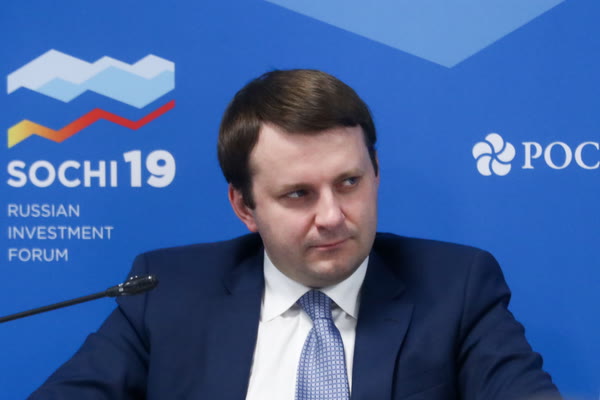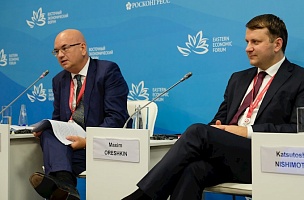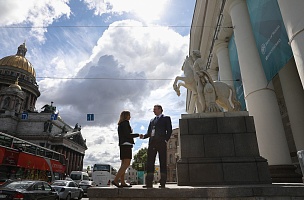KEY CONCLUSIONS
The regions demonstrate economic conditions conducive to implementing national projects
«The start is crucial: the way we start implementing all this work will determine the way it goes further. Our start is rooted in good basic performance. Over the last year, all regions showed an increment in their revenues. Generally all 85 regions gained 15%. Most regions ran a budget surplus, which brought us to the total surplus of over 500 billion roubles. That has never happened since 2007. And another important thing, our government debt began going down,» Anton Siluanov, First Deputy Prime Minister of the Russian Federation — Minister of Finance of the Russian Federation.
National projects are a dynamic tool
«National projects are not something stiff, and we agreed that during implementation of the projects we will review state funding. That’s why if there’s a project in need for state support, while another one is stuck, the funding will get redistributed,» Anton Siluanov, First Deputy Prime Minister of the Russian Federation — Minister of Finance of the Russian Federation.
«National projects are, of course, great. But things always need to be somewhat polished, and I don’t think decisions should be perceived as dogma,» Anatoly Artamonov, Governor of Kaluga Region.
PROBLEMS
Tight deadlines for national projects
«Now we need to sign agreements that will define action parameters in regards to national projects and Russia’s regions: subsidy-related monetary agreements and agreements on implementing national projects. <...> National projects and subsidies require 1,866 agreements. As of yesterday, we have 1,322 signed. We have two days left to sign these agreements: subsidy-related ones and performance-related ones for Russia’s regions. If we fail to do so before 15 February, the money will go to the Reserve Fund,» Anton Siluanov, First Deputy Prime Minister of the Russian Federation — Minister of Finance of the Russian Federation.
Regions face unequal conditions for implementing national projects
«All regions have different conditions, while we’ve set the same objective for them. Are they capable of delivering on the same task being in unequal conditions?» Andrey Makarov, Chairman of the Committee on Budget and Taxes, The State Duma of the Federal Assembly of the Russian Federation.
«Each region of Russia has a special feature. Let me give you an example. How can Tula show an increment in air freight with no airport infrastructure available?» Alexey Dyumin, Governor of Tula Region.
Mechanisms for implementing national projects are half-baked
«Our region has signed 40 agreements, 4 haven’t reached us yet, the clock is ticking. We sign on to certain figures and performance indices without understanding what methods, mechanisms or estimations will be used. We haven’t been informed and haven’t agreed to them,» Alexey Dyumin, Governor of Tula Region.
SOLUTIONS
Integrated approach to implementing national projects
«It’s impossible to improve the quality of life just by increasing salaries or benefits. A serious solution for complex objectives lies ahead of us. We can’t say that some national projects are a bigger priority than others. They can only be tackled all together,» Andrey Makarov, Chairman of the Committee on Budget and Taxes, The State Duma of the Federal Assembly of the Russian Federation.
Developing mechanisms for implementing national projects
«Our objective is to find the right way to channel resources and efforts to deliver on our objectives. We have 15 indices and methods to set objectives for each region; some of those indices have specific targets for each and every region,» Anton Siluanov, First Deputy Prime Minister of the Russian Federation — Minister of Finance of the Russian Federation.
«We need to get through the question stage as fast as possible under condition that we understand how we will proceed with methods. Specific performance targets may be somewhat realigned. They just need a procedure for a public and transparent discussion,» Maxim Reshetnikov, Governor of Perm Territory.
Attracting private investment to national projects
In 2019, 2020 and further on, funding will be streamed towards regions to implement national projects. And this money will be the foundation for stimulating economic activity, which means private investment will grow and there will be more opportunities to build up the revenue base for regional budgets," Anton Siluanov, First Deputy Prime Minister of the Russian Federation — Minister of Finance of the Russian Federation.
«In terms of economic policy’s real success, we need to pay attention to the ratio between public and private investment. <...> And I mean real private investment, not just the ones made by state corporations, which are only reported as private in statistics, but actual private ones. It’s trust in the society, lowering the poverty level and the rest of the parameters,» Vladimir Mau, Rector, Russian Presidential Academy of National Economy and Public Administration (RANEPA).
Individual approach to every Russian region’s problems and potential
«We need to sit down with every region and work on the existing agenda. What we’re trying to do economy-wise: under the State Council working group we’re trying to create a system, but at the same time we work with Tula Region, look into a number of measures in Dagestan and we’ll keep working with the Governor of Astrakhan Region. That’s why working individually with each and every region is truly important. We can achieve results only by working together,» Maxim Oreshkin, Minister of Economic Development of the Russian Federation.
«Through analyzing their own situation, each region needs to clearly understand what they need to affect for overcoming poverty, to clearly understand what measures are a priority for them,» Tatyana Golikova, Deputy Prime Minister of the Russian Federation.
Avoiding overregulation
«We agreed to stop regulating the regions’ authority from the top-down; we agreed that there will be no more decisions that are not tied to specific financing. If we are making decisions, we need to transfer a corresponding source of income,» Vitaly Mutko, Deputy Prime Minister of the Russian Federation.
«We need to call off overregulating. It might make sense to give the regions an opportunity to regulate certain issues, let them decide. After all, we may go back to budgetary federalism. <...> The problem is that no method leaves them any room for maneuver,» Andrey Makarov, Chairman of the Committee on Budget and Taxes, The State Duma of the Federal Assembly of the Russian Federation.
«We’ve had a replacement. Sometimes we replace even administrative authority with financial one. It’s a truly dangerous thing. We don’t let the regions develop and in certain cases we don’t give them a chance to make their own decisions, that will focus on the national projects, their performance targets and national goals,» Tatyana Golikova, Deputy Prime Minister of the Russian Federation.






